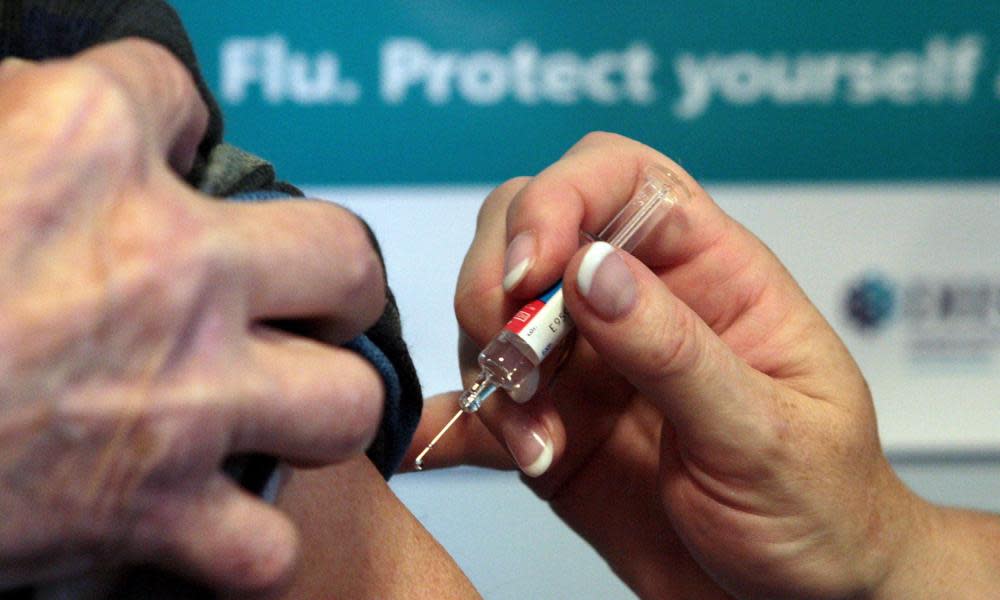Concerns over low uptake of winter flu jab in England

Fewer than half those eligible for a free winter flu jab have had one, despite high-profile warnings that this winter could bring the biggest flu outbreak in years, NHS figures reveal.
The low uptake, which will alarm NHS bosses, come as many hospitals showed clear signs of starting to buckle under the extra demand for care caused by the cold snap that began last week.
Barely two in five people in several of the groups judged to be most at risk of getting flu because of their health status have been vaccinated so far, data published on Thursday by NHS England shows.
Just 44% of people aged under 65 with an underlying medical condition, and only 43% of pregnant women, have had the jab.
The NHS is offering it free to 21 million people in England this winter – the highest number ever – in a £237m campaign which it hopes will help avoid a flu epidemic.
Uptake among primary school aged children is even lower than among adults. Fewer than one in five pupils in their reception year (18.1%), and the same low proportion in school years one (17.9%), two (17.5%), three (17%) and four (16.2%), have been immunised. Children in that age group are offered the vaccine in a nasal spray.
In addition, only 46% of NHS staff had the jab by the end of October, the period covered by the data, with some GPs among those who had not yet been vaccinated. That stubbornly low number is despite NHS hospital trusts making determined efforts to persuade staff to get immunised, to protect themselves, fellow workers and patients.
NHS England said: “Latest figures show that 437,720 healthcare workers with direct patient contact had their flu jab between 1 September and 31 October. This is an uptake rate of 46% and 6% higher than the same period last year. However, more than half a million healthcare workers – 514,808 in total – including some GPs, are yet to be vaccinated.”
Dr Nick Scriven, the president of the Society for Acute Medicine, which represents acute and general medical specialist hospital doctors, said that some NHS staff doubt the vaccine would work. “It will hopefully be better than last year but there is no proof yet.
“The flu vaccine was the major part of NHS England and NHS Improvement’s joint winter resilience plan and seemed to be the thing they were pinning their hopes on. So if uptake is poor this will be a major risk going through the next weeks and months.”
Scriven has accused NHS staff who do not have the jab of abdicating their professional duty as healthcare workers, and hospitals would rightly “take a very dim view of doctors who are not vaccinated who fall sick with flu”.
The figures also show how hospitals came under serious pressure last week, which delivered the first snow in what is expected to be a cold winter.
One in eight (11,852) ambulance patients had to wait outside an A&E unit for at least 30 minutes before being handed over to hospital staff because the emergency department was so busy – up from 10,184 the week before.
A total of 2,337 of these patients had to wait at least an hour in the back of an ambulance, despite NHS rules that no patient should have to spend more than 15 minutes there during this winter.
Jonathan Ashworth, Labour’s shadow health secretary., said: “Last week’s cold snap demonstrated in the starkest fashion that winter has arrived. Patients will be deeply concerned that despite the heroic efforts of our brilliant NHS staff, there was a shocking 27% increase in the number of patients stuck for over an hour in the back of an ambulance in just one week.”
In other signs of hospitals’ difficulty keeping up with rising demand:
• A&E units had to temporarily divert patients elsewhere 25 times last week because they could not cope, up from 11 the week before;
* Thirteen of those 25 diverts occured at Worcestershire Royal Hospitals, where two patients died in the space of four days last winter, one after reportedly spending 35 hours on a trolley;
* Hospitals remain far fuller than NHS guidelines say they should be in order to guarantee safe patient care. Overall 94.6% of general and acute beds were occupied in the week 4-10 December, though the target is 85%;
* Norovirus is becoming a problem. An average of 1,123 beds were closed every day due to the winter vomiting bug, almost double the 664 a week earlier.
“When we talk about the NHS at the moment, all we can say and see is pressure, pressure and more pressure – the system is on a knife-edge”, Scriven said.
“This week alone, frontline staff from across the UK are reporting their hospitals are ‘imploding’, there is ‘carnage on the ground’ and they are run off their feet.
“Some hospitals are already cancelling planned surgery and that is something patients will face increasingly over the winter months.”

 Yahoo News
Yahoo News 
